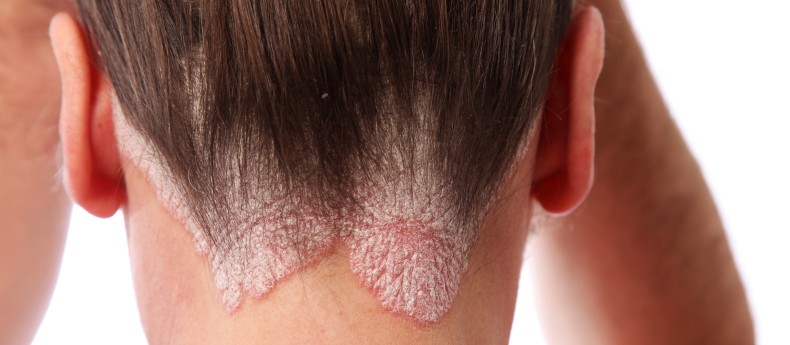
Struggling with Psoriasis
I don’t know anyone who learns about psoriasis for the heck of it. But the fact remains that many more people have psoriasis than are diagnosed with it. Psoriasis is a chronic inflammation disease. Symptoms include itchiness, sore patches of skin, thick and/or red skin, and a trait most unique to psoriasis…silver-white scales.
The normal life span of skin cells is about 28 days. Skin cells that are seriously affected by psoriasis have a life span of about seven days. Many people who begin to develop psoriasis brush it off (pardon the pun) as no big deal, so they pick at their skin, causing the scales to shed. However, nervous or intentional scratching could remove all the layers of skin protecting their flesh from the outside world. Without skin, psoriasis could worsen very quickly.
There are two known causes of psoriasis: an immune system disturbance and simple inherited genes.
There’s nothing you can really do about the genetic cause, but your immune system could start pushing you toward psoriasis for any of the following reasons:
- stress
- unrelated bacterial/viral infections
- another skin injury
- humidity or dry air
- hard water
- too much sun (getting a tan) or too little sun
- alcohol
- smoking
- blood-thinning medications
- medicines: malaria medicines, ibuprofen, beta-blockers, or other anti-inflammatory medicines
Psoriasis can develop with an imbalance of any of these triggers, and it can recur just as easily. Many children develop psoriasis after their immune system has suffered a big attack, e.g., while recovering from tonsillitis or another disease/injury.
If your psoriasis tends to occur together with allergic reactions, your psoriasis is probably a chronic skin condition that is related to your genes. In this case, you’ll want to consult a dermatologist to see how you can manage your condition. Allow me to add here that it’s important to consult a professional dermatologist to make sure you’re not just reacting to a new environment. A lot of foreigners develop temporary skin reaction when they first move to Beijing.
If your psoriasis tends to occur when you encounter certain things in your environment, you can avoid those triggers. For example, some people have psoriasis flare-ups when they eat spicy foods, drink alcohol, or smoke. These activities tend to dilate your blood vessels, which circulate triggers to weak areas of your body that may develop psoriasis more easily.
Beware of over-the-counter (OTC) medicines. I don’t recommend using drugs or products from street-side pharmacies, especially here in China. You can’t be sure what unknown medicines are actually doing to your body. For example, some people read online that Vitamin A acid is good for psoriasis. However, without proper medical advice, these same people wouldn’t know that Vitamin A acid must be washed carefully from your hands to prevent other problems from occurring through contact with the acid. The best course of action would be to consult a doctor to learn which products are best for short-term relief and which are good for long-term disease management.
A dermatologist could help determine whether you have psoriasis, but it’s difficult to prevent the next flare up if the cause is unknown. Psoriasis can be triggered by just about anything. A dermatologist would need a fairly thorough knowledge of a person’s lifestyle and medical/family background to determine what the relevant triggers for psoriasis are in any one particular case.
The important thing is to manage your own stress levels (trigger #1 on the list above). Anxiety about your own psoriasis could aggravate your condition. Stay positive. Find a doctor you can trust. And give your body some credit; human bodies have incredible restorative abilities. If you’ve developed psoriasis because your system is unbalanced, remove yourself from the trigger, and let your body go about its natural business of self-healing.
Copyright United Family Healthcare 2014 All right reserved - 京卫网审[2014]第1927号 - 京ICP备13017554号-4
深圳新风和睦家医院 广审号:粤(B)广[2024]第09-10-1049号



